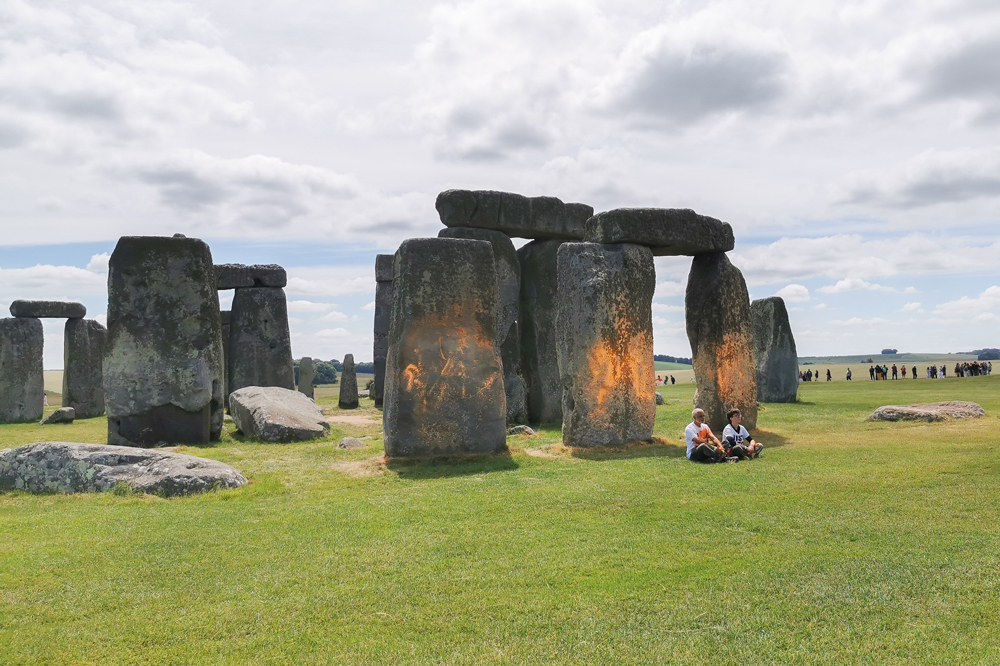Two activists representing Just Stop Oil have been arrested for spraying Stonehenge with orange powder. The protestors – a 21-year-old student from Oxford and a 73-year-old man from Birmingham – carried out the act on Wednesday, two days before thousands of people visited the megalithic site to celebrate the summer solstice. Video footage shows members of the public wresting the spray cans away from the activists. The orange powder, which according to Just Stop Oil was made of cornflour, has since been removed from the stones. Experts will inspect the monument to see if any lasting damage has been done. Just Stop Oil is demanding that the UK government ends the extraction and burning of fossil fuels by 2030, which the protest group argues ‘will result in the death of millions’. In recent months, Just Stop Oil activists have also damaged a case surrounding a copy of the Magna Carta at the British Library and thrown soup over the glass screen protecting Van Gogh’s Sunflowers (1888) at the National Gallery in London.
Matthew Teitelbaum, the director of the Museum of Fine Arts (MFA) in Boston, has announced his retirement. He joined the museum in August 2015 and will step down next August, meaning that he will have spent precisely a decade in the role. Before joining the MFA, he had spent 17 years as director of the Art Gallery of Ontario in Toronto. His accomplishments at the MFA include refurbishing and reopening permanent spaces for highly respected collections of Japanese and ancient Egyptian, Greek and Roman art. In 2021, the MFA opened its Center for Netherlandish Art, which comprises a library, a research centre and a significant collection of Dutch and Flemish art. But Teitelbaum’s tenure has also been marked by challenges. In 2019, a group of visiting honours students accused museum security guards and a gallery-goer of mistreatment, including racial profiling, which led the museum to hire its first senior director of belonging and inclusion in 2020. That same year, during the coronavirus pandemic, the museum terminated the employment of 57 employees, with an additional 56 taking early retirement. ‘These are challenging times, but my God, people need museums more than they ever have,’ he told the Boston Globe upon announcing his retirement. ‘The MFA’s best days are ahead of it.’
The art dealer Barbara Gladstone has died at the age of 89 after a brief illness. She was a teacher of art history until her forties, at which point she set up Gladstone Gallery in Manhattan, which went on to expand significantly: it currently has two large premises in Chelsea and another space on the Upper East Side, as well as outposts in Los Angeles, Brussels and Seoul. She is known for the close professional relationships she nurtured with the artists she worked with. She exhibited artists including Matthew Barney, Alighiero Boetti, Rosemarie Trockel, Carrie Mae Weems and Arthur Jafa; she gave Barney his first solo show in New York in 1991 and co-produced his film series The Cremaster Cycle (1994–2002). Gladstone Gallery represents more than 70 artists and estates, including those of Keith Haring and Robert Mapplethorpe.
The Art Institute of Chicago (AIC) has announced that it will return a 12th-century pilaster fragment to its place of origin in Thailand. The stone piece, which depicts the Hindu deity Krishna lifting up the sacred Mount Govardhana, has been traced to the doorframe of the Phanom Rung temple in the eastern part of the country, despite being previously thought to have originated in Cambodia. In a statement, the AIC said that it had ‘proactively reached out to the Thai government’ to initiate the return after ‘conducting new research on this object’. Phnombootra Chandrajoti, director-general of the fine arts department at the AIC, said: ‘This act serves as a model for ethical collecting practices and strengthens the bond of cultural respect and collaboration’. In 1988, the AIC returned a lintel engraved with the figure of Vishnu to the same temple, one of the most significant monuments built by the Khmer people in Thailand.
The Centre Pompidou has announced the architects it has chosen to lead its redesign. Nicolas Moreau and Hiroko Kusunoki of the practice Moreau Kusunoki, which designed the Guggenheim Helsinki and Sciences Po’s new Paris campus, along with the architect Frida Escobedo, who redesigned the modern art wing of the Met in New York, will lead the redevelopment of the centre, which houses the Musée National d’Art Moderne, a public library and a music research space. Moreau Kusunoki has said that it ‘aims to rationalise and simplify the spatial organisation’ of the space while preserving its original ‘spirit and DNA’. The project is part of the €262m refurbishment of the centre, intended to remove asbestos and renovate the building’s structure. The centre will be closed for five years from September 2025.
